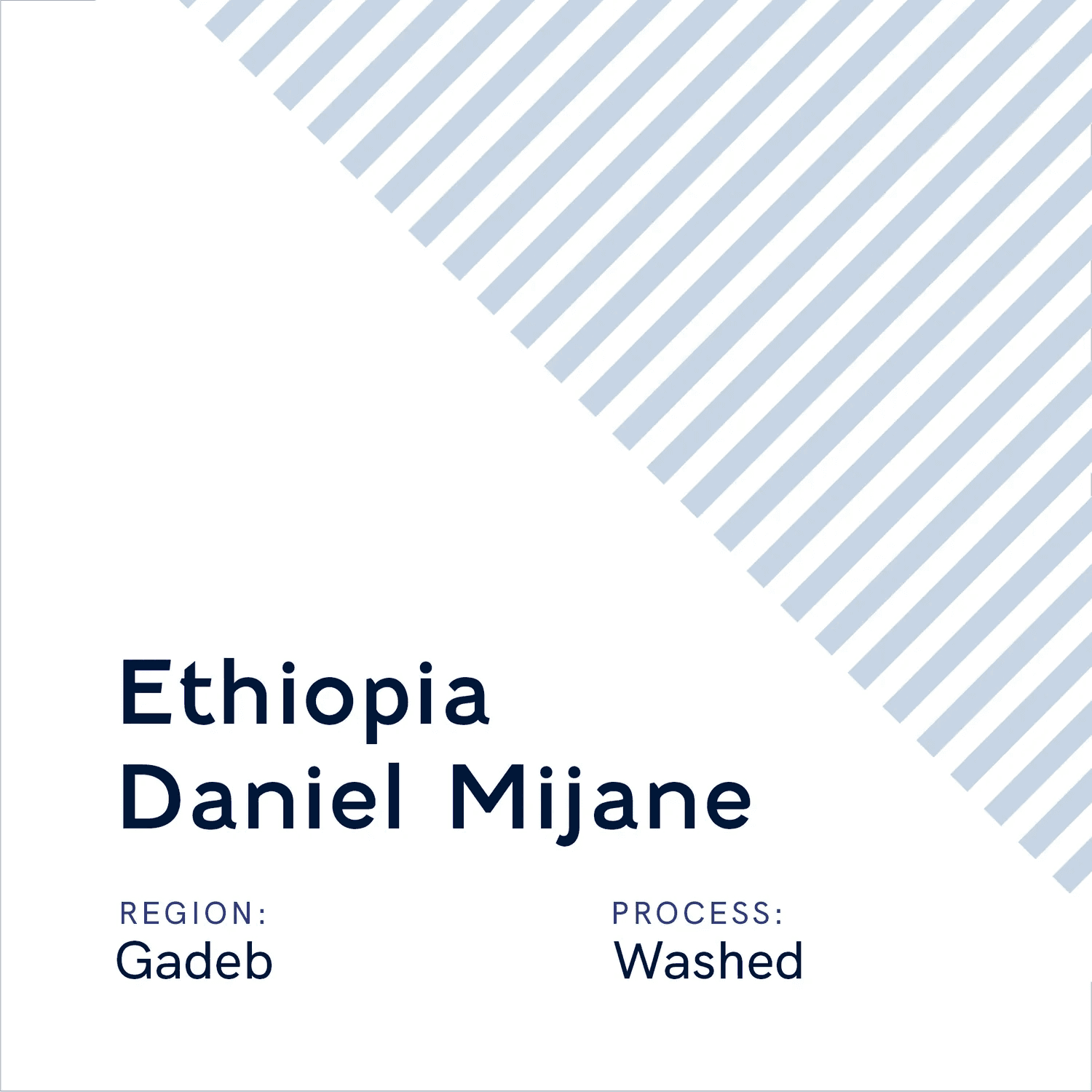Th3rdwave Directories
Cafés
Roasters
Coffees
Guides
Awards
Th3rdwave Coffee Club
Subscription
Gift subscription
Current edition
Past editions
Shop
Advent Calendar
Coffee games
Th3rdwave Wallet
Loyalty cards
Gift cards
Th3rdwave for cafés
Th3rdwave for roasters
Get free coffee
Daniel Mijane
Yirgacheffe is part of the Sidama region in Ethiopia; however it's considered its own recognized micro-region due to the unique coffee profile produced on its territory. The Yirgacheffe region is known to have thick vegetation, healthy soil, and high elevations.
This coffee is sourced from Daniel Mijane and the 410 farmers at the Worka Sakaro washing station in Gedeb, Yirgacheffe. The Mijane family’s involvement with farmers begins long before harvest in the form of harvest trainings and the establishment of seasonal cherry collection sites—local delivery points that reduce overland travel for farmers and provide a quality inspection point for the washing station. During harvest season, as cherries arrive, Worka Sakaro conduct a final inspection for uniform ripeness, foreign matter, and overall quality, before admitting cherries to be processed. After de-pulping, coffee typically ferments for 48 hours, is rinsed, and then skin-dried in the shade until no longer wet to the touch. Once ready to transport, parchment is moved to full-time drying beds in the sun where it will be continuously rotated and aerated for one week, typically being covered during the hottest hours of the day, 11:00am - 3:00pm, when the intensity of the sun can potentially crack the coffee’s brittle parchment.
The resulting cup reminds us of peach, earl grey and blackberry jam.
This coffee is sourced from Daniel Mijane and the 410 farmers at the Worka Sakaro washing station in Gedeb, Yirgacheffe. The Mijane family’s involvement with farmers begins long before harvest in the form of harvest trainings and the establishment of seasonal cherry collection sites—local delivery points that reduce overland travel for farmers and provide a quality inspection point for the washing station. During harvest season, as cherries arrive, Worka Sakaro conduct a final inspection for uniform ripeness, foreign matter, and overall quality, before admitting cherries to be processed. After de-pulping, coffee typically ferments for 48 hours, is rinsed, and then skin-dried in the shade until no longer wet to the touch. Once ready to transport, parchment is moved to full-time drying beds in the sun where it will be continuously rotated and aerated for one week, typically being covered during the hottest hours of the day, 11:00am - 3:00pm, when the intensity of the sun can potentially crack the coffee’s brittle parchment.
The resulting cup reminds us of peach, earl grey and blackberry jam.
Yirgacheffe is part of the Sidama region in Ethiopia; however it's considered its own recognized micro-region due to the unique coffee profile produced on its territory. The Yirgacheffe region is known to have thick vegetation, healthy soil, and high elevations.
This coffee is sourced from Daniel Mijane and the 410 farmers at the Worka Sakaro washing station in Gedeb, Yirgacheffe. The Mijane family’s involvement with farmers begins long before harvest in the form of harvest trainings and the establishment of seasonal cherry collection sites—local delivery points that reduce overland travel for farmers and provide a quality inspection point for the washing station. During harvest season, as cherries arrive, Worka Sakaro conduct a final inspection for uniform ripeness, foreign matter, and overall quality, before admitting cherries to be processed. After de-pulping, coffee typically ferments for 48 hours, is rinsed, and then skin-dried in the shade until no longer wet to the touch. Once ready to transport, parchment is moved to full-time drying beds in the sun where it will be continuously rotated and aerated for one week, typically being covered during the hottest hours of the day, 11:00am - 3:00pm, when the intensity of the sun can potentially crack the coffee’s brittle parchment.
The resulting cup reminds us of peach, earl grey and blackberry jam.
This coffee is sourced from Daniel Mijane and the 410 farmers at the Worka Sakaro washing station in Gedeb, Yirgacheffe. The Mijane family’s involvement with farmers begins long before harvest in the form of harvest trainings and the establishment of seasonal cherry collection sites—local delivery points that reduce overland travel for farmers and provide a quality inspection point for the washing station. During harvest season, as cherries arrive, Worka Sakaro conduct a final inspection for uniform ripeness, foreign matter, and overall quality, before admitting cherries to be processed. After de-pulping, coffee typically ferments for 48 hours, is rinsed, and then skin-dried in the shade until no longer wet to the touch. Once ready to transport, parchment is moved to full-time drying beds in the sun where it will be continuously rotated and aerated for one week, typically being covered during the hottest hours of the day, 11:00am - 3:00pm, when the intensity of the sun can potentially crack the coffee’s brittle parchment.
The resulting cup reminds us of peach, earl grey and blackberry jam.
Coffee origin
Country
Ethiopia
Region
Yirgacheffe
Variety
heirloom
Altitude
2000 - 2200 m
Farm
410 smallholder farmers
Producer
Daniel Mijane
Roast level
Light
Process
washed
Tastes like
🍑
peach
🍵
earl grey
🍓
blackberry jam
Community reviews
😍
5.0 Extraordinary
2 Reviews
Recipes
Check out more in the App









